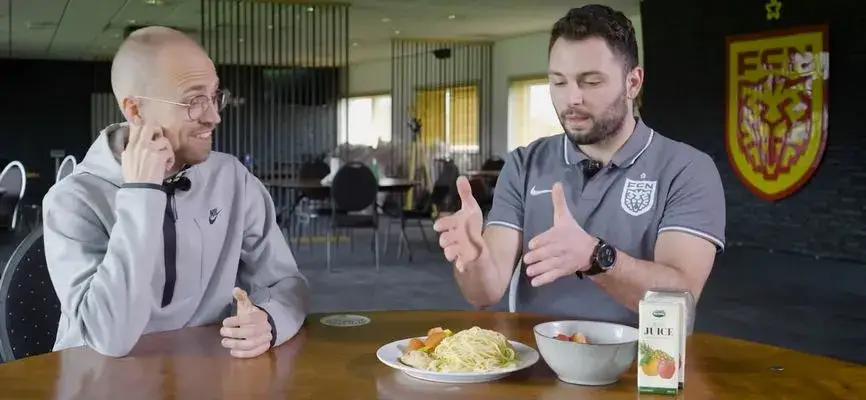Physical Address
304 North Cardinal St.
Dorchester Center, MA 02124
Physical Address
304 North Cardinal St.
Dorchester Center, MA 02124

Soccer is the most popular sport in the world. Playing the game at the elite level is physically demanding, with matches combining aerobic and anaerobic activity. Nutritional needs vary according to individual needs, training regimen, body composition, and overall health.
During a 90-minute match, players must be able to vary their pace between a walk, jog, sprint, and run. This can cover 5 to 6 minutes while accelerating up to 60 times, all while changing directions and controlling the ball.
The proper fuel is needed for the body to maintain stamina and reduce fatigue. After all, soccer players must be agile and fast; therefore, keeping body fat down is at a premium. But players should be aware of what foods to eat.
Here are some tips for proper nutrition before and during the match.
Being adequately fueled on the day of the game is vital, but be sure to give yourself at least three hours of digestion. Therefore, you should consume breakfast about two to three hours before practice or a match.
Ideally, you should have the game breakfast before the match as you would regularly, so try to eat the same breakfast for at least two weeks before the first game of the season and maintain this throughout.
If your practice or match is at noon, breakfast should be eaten before 9:30 AM. Also, avoid caffeine in the morning. This prepares the body, acclimating it to the same routine every day.
The perfect breakfast should provide protein and carbohydrates. Fruit juices such as orange or grapefruit, whole grain cereal, oatmeal, yogurt, and fresh and dried fruits give all that is needed. Before eating, drink a glass or two of water to prevent dehydration.
While it’s ok to have some fat in your meal, the best diet for athletes is one high in complex carbohydrates. A diet full of pasta, rice, whole-wheat bread, biscuits, potatoes of any variety, granola, and energy drinks is ideal.
However, be sure the diet is balanced with vitamins, minerals, fiber, protein, and some fats. Be smart with the diet and involve all food groups, but heavier on the complex carbohydrates for added energy.
To run down what should be consumed daily:
1. Make sure to include the following: fruits, vegetables, and salads.
2. Include rice, whole grain pasta, chicken, turkey, grilled fish, eggs, beans, and lean cuts of red meat.
3. Limit desserts, but you can include low-fat dairy sweets.
4. Consume a variety of nuts throughout the day for healthy fats and added protein. Since you will be very active and burn many calories in practices and matches, you probably don’t have to worry about gaining weight.
The biggest question is whether or not to consume caffeinated drinks. On the one hand, caffeine in moderation can help with energy since it’s a stimulant, but what it does to the nervous system or metabolism is unclear and may vary from person to person. Caffeine can also make one dehydrated more rapidly, which can reduce performance and be dangerous. Limiting caffeine or eliminating it before and during a match is best.
One way to determine if you can have that cup of coffee in the morning or a glass of tea is to assess the conditions for the day. What is the temperature, humidity level, effort likely required for the day, etc.? Be sure to drink before you feel thirsty because once you feel thirsty, dehydration sets in.
It’s best to begin the morning with a glass or two of water and continue to hydrate until about 30 minutes before the match. Continue to replenish fluids throughout the match, if possible, during time outs or during times on the sideline. After the game, drink plenty of fluids to replenish and rehydrate.
Choose healthy snacks for both pre-game and post-game, which can include the following:
By consuming carbohydrate drinks that also include electrolytes, the body becomes more hydrated, and glucose levels are maintained for optimum performance. As a match progresses, the glycogen in the muscles of the body decrease, which causes fatigue. This could result in poor technique and execution on the field.
Large amounts of sweat losses are bound to occur during hot weather conditions, combined with humidity and high-energy activities such as soccer. These losses can range from a quart to a gallon. The problem is that opportunities to replenish fluids are generally limited to pre-game and halftime, but during injury timeouts, there are chances to drink.
Therefore, players should start the match well-hydrated by consuming plenty of fluids leading up to the game. Regular amounts of clear or nearly clear urine are good indications of being hydrated. Ideally, players should work with an Accredited Sports Dietitian to discuss nutrition before, during, and after the competition.
An effective way to combat or prevent second-half fatigue is to consume about 40 grams of carbohydrates at halftime. Players with the highest workload, such as the midfielders, should eat a high-carbohydrate snack at halftime.
Such snacks could include bananas, dates, toast with jelly, sports drinks, or granola. Chopped or dried fruit is another quick and easy snack option. Specialized sports nutrition products such as gels and energy bars are also effective.
In conclusion, high-intensity sports such as soccer require not only the proper training on the field but the proper training in terms of nutrition. Be sure to drink plenty of fluids before a match and practice and during breaks and intermission, but limit caffeine since it’s a diuretic.
A diet rich in complex carbohydrates, lean proteins, and healthy snacks such as nuts and fruits is also vital. Energy drinks and other specialized fitness nutrition products are also helpful. Take care of your body correctly, and your body will take care of you during a long, grueling soccer match.